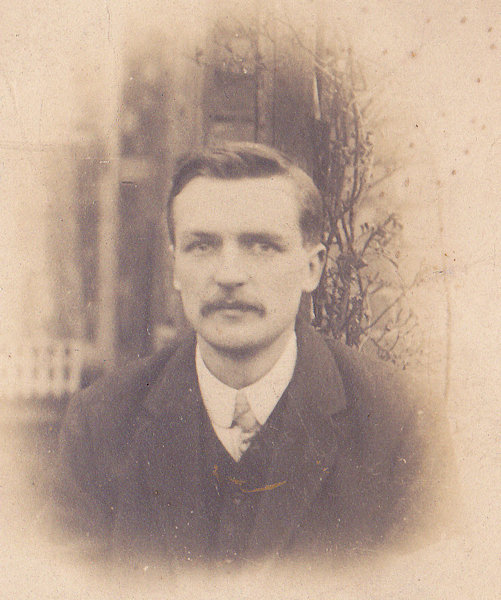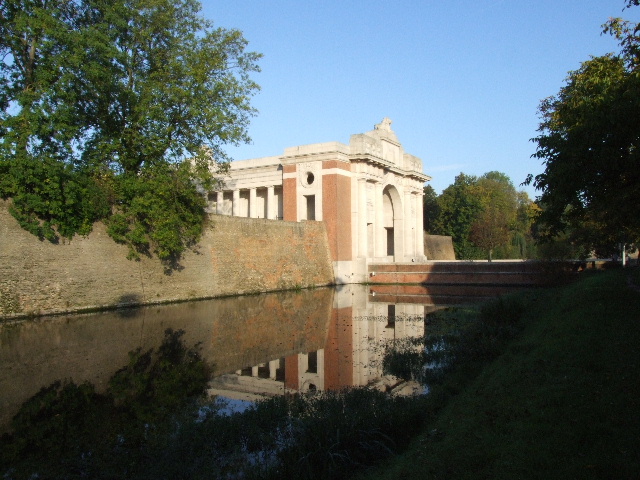Name
Percy Buck
Conflict
First World War
Date of Death / Age
31/07/1917
26
Rank, Service Number & Service Details
Private
267098
Hertfordshire Regiment
1st Bn.
4 Coy.
Awards: Service Medals/Honour Awards
British War and Victory medals
Cemetery/Memorial: Name/Reference/Country
YPRES (MENIN GATE) MEMORIAL
Panel 54 and 56
Belgium
Headstone Inscription
N/A
UK & Other Memorials
St Albans Citizens Memorial, Town Hall (old) Memorial, St Albans, St Saviour's Church Memorial, St Albans, Hitchin Town Memorial, St Mary's Church Roll of Honour (Book), Hitchin, 4 Coy' Hertfordshire Reg' Territorials Memorial, Hitchin
Pre War
Wartime Service
Biography
Percy was born in Peterborough in the county of Northamptonshire in 1891 to a working-class family that made the move to the Hertfordshire market-town of Hitchin soon after the turn of the century, his home was at No 19 Baliol Road. It was in Hitchin that young Percy was raised and schooled, visiting St Mary’s church each Sunday where, in his teens, he became a Sunday School teacher.
During his time in Hitchin he was in the choir of St. John's Church and was a sidesman at St. Mary's Church. In addition, he was the first Scoutmaster of the St. John's Troop and a Sunday school teacher.
After finishing his education, Percy took up work locally as a Printer’s Compositor. He had served an apprenticeship with Carling, Paternoster & Hales the Hitchin printers
He joined the local Territorial unit, the Hertfordshire Regiment, in which he showed promise, being promoted to the rank of Sergeant, serving as one of ‘G Company’s’ musketry instructors. Percy met and married local girl Bertha Stevens on 9th November 1912, together they moved to Upper Culver Street, St Albans where Percy found better opportunities to further his career. On 15th August 1914, just days after the outbreak of war, Mrs Bertha Buck gave birth to a son, Cyril. Records today are unclear, but it appears that in the months before the outbreak of war, Percy’s time with the Territorials came to an end, possibly due to his move to St Albans.
It should come as no surprise that when war was declared, and feeling the pressure to support his young family, Percy did not immediately re-enlist into the Army, although his time was to come.
Surviving records tell us that, after re-enlisting in the Hertfordshire Regiment on the 10th January 1916, Percy began his initial training and by the 12th August had achieved the rank of Lance Corporal. He was further promoted on to the rank of Corporal on the 23rd September 1916 and, ready to play his part in the war, was held in the UK as part of a Reserve Battalion awaiting the opportunity for overseas service.
On the 13th November 1916, the Hertfordshire Regiment, part of the 118th Brigade, 39th Division, took part in the last phase of the Somme Offensive, an action named the Battle of the Ancre. The Battalion suffered a high level of casualties during this time and readily trained replacements were soon sought from the reserves held in the UK.
Percy Buck was amongst the replacements who arrived at Folkestone on the 24th November to await embarkation for the Western Front. The following day, after a short hop across the English Channel, Percy found himself at the 17th Infantry Brigade Depot in Boulogne, and it was, whilst here, that Percy was re-graded as a Private, probably due to the ranks of the Herts having their full complement of Non-Commissioned Officers at the time.
Percy joined the already experienced men of the Hertfordshire Regiment in the field in mid-December 1916 as they were spending a cold winter period in the trenches of the Ypres Salient. Here he learned how to survive in the trying conditions of trench warfare.
By May 1917 Percy and his comrades had left the frontlines for a period of training for the upcoming summer offensive, in which the Battalion were to play a key part.
By July of that year, their training complete, the Herts were back near Ypres, again ‘in the line’. On 7th July Percy wrote home to his brother:
“My dearest Brother, Just a line to thank you for your letter I received Saturday. I hope you are still quite well. I also hope that by now you have received that card you have been looking forward to for such a long time. I am glad to say I am quite well and joying lovely weather in the country. Kiss Cyril for me. Now I must close, with much love to you and all at home. Your loving brother. God keep you safe til I return.”
Three weeks later, Percy and the men of the Herts were to face their sternest test of the war outside the small Belgian village of St Julien.
At 10.10am on 31st July 1917 Percy and the men of the 1st Herts Regiment left the banks of the river Steenbeek into a hail of German machine-gun, rifle and artillery fire. Advancing over 400 yards, Percy was fortunate to survive the initial attack unscathed, despite losing more than half of his comrades en-route.
The advance of the men of the Herts Regiment was finally held up some 100 yards short of their objective by a ten-yard-thick belt of unbroken barbed wire, covered by machine guns, which, to that point had been hidden by a thick hedge. With no way of advancing, and the enemy fire increasing all the time, the Battalion had no choice but to take to ground in any shell hole or ditch they could find.
After being stuck in the open in front of the enemy for close to an hour, the remnants of the Battalion made a hurried withdrawal to their start positions of that morning. Less than 100 of 620 men that started the attack made in back to the Steenbeek, Private Percy Buck was not amongst them.
Around one week later, Percy’s wife Bertha received the dreaded news that her husband was reported ’Missing in Action’. Bertha Buck stayed in this awful state of limbo for several months, not knowing the fate of her husband, until on 8th October 1917 a letter, postmarked ‘Geneva, Switzerland’ arrived on the doorstep of No 19 Baliol Road in Hitchin. It read:
“I beg to enclose a postcard which I took from a British soldier in St Julien, Flanders. He was holding the card in his hand, and as I learned later on, that the finder was asked to forward it to his wife. I wishing to fulfil the last will of the dead comrade, send it to you with the request that you forward it to his wife. The address is written on it. He fell on 31st July 1917 or 1st August near St Julien in Flanders. May he rest in peace. I should be very pleased to hear whether the wife has received the card. Respectfully, Gefreiter Josef Wilczek.”
The finder was a German soldier, who, showing incredibly humanity to the wife of his enemy, saved Mrs Buck from a continued ordeal of now knowing what fate had befallen her husband.
Joseph Wilczek was himself not to survive the war, being killed less than ten days before the end of the conflict. Neither he of Percy have a known grave.
St Juliaan (St Julien)
The 1st Hertfordshire Battalion were in support of an attack on the Langemarck Line and a general bombardment of the German lines commenced at 3.45am on the 31st July and the planned assault began. It had three objectives to achieve known as Blue, Black & Green and units of the 116th Brigade easily captured the first two objectives, preparing the way for the forward companies of the Hertfordshire battalion, to take the third objective.
They had marched from Vlamertingue to their assembly position arriving by midnight on the 30th/31st July 1917. A general bombardment of the German lines commenced at 3.45am on the 31st July. At 05.00am the Hertfordshires left their assembly positions to attack their objective, which lay over the crest of a ridge.
As they made their way forward, they came under heavy fire from both German machine guns and snipers but after eliminating a German strongpoint moved up towards St. Juliaan, which was only lightly held. The Battalion crossed the Steenbeek with some difficulty and two of its supporting Tanks became bogged down in the mud. Things then went from bad to worse. A pre-arranged artillery barrage never materialised due to the guns being unable to move forward over the muddy terrain and the German barbed wire defences, which were fifteen feet deep in some places, were found to still be intact. It was soon realised that ground could only be won by section "rushes" supported by the unit’s own fire.
The Cheshire Regiment were on the right of the battalion but the Black Watch, who were due to cover the left flank, had been seriously delayed. This left the Hertfordshire Regiment seriously exposed, the Germans exploited this by bringing a hurricane of fire down upon the stricken troops. This was followed by a German counterattack and by 10.30am it was clear that the objective could not be achieved. Casualties were very heavy with 459 men being killed, missing or wounded. This was 100% of its Officers and about 75% of its Other Ranks.
The incredible story of Percy Buck was shared in a newspaper article in 2014 and seen by Percy’s grand-daughter.
Acknowledgments
Gareth Hughes, Adrian Dunne, David C Baines, Jonty Wild, Dan Hill, Paul Johnson



